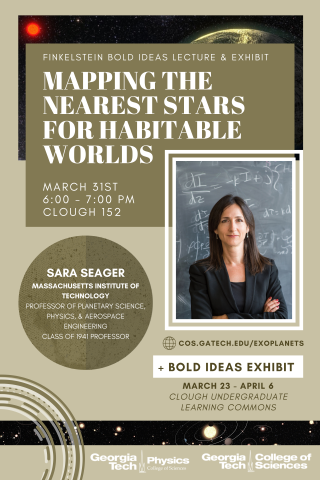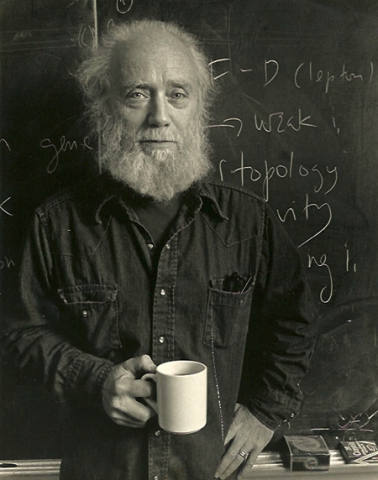event
(Postponed) Finkelstein Bold Ideas Exhibit and Lecture: Mapping the Nearest Stars for Habitable Worlds
Primary tabs
The 2020 Finkelstein Lecture with Sara Seager, originally scheduled for March 31, 2020, has been postponed. Please visit cos.gatech.edu for further updates.
The Bold Ideas in Physics series celebrates the life and work of David Ritz Finkelstein, the late Georgia Tech School of Physics professor who was unafraid to challenge orthodoxy (and the first to show, at age 29, that anything falling inside a black hole cannot escape — as well as one of the first in his field to bring topology into quantum physics).
Join us on this March as we celebrate Finkelstein's life and legacy, and expand on his bold ideas in physics with exoplanet explorer Sara Seager — referred to by NASA "an astronomical Indiana Jones."
Before or after the March 31 lecture, take a self-guided tour through the Bold Ideas in Physics Exhibit, which will be open to all from March 23 to April 6 in Clough Undergraduate Learning Center.
March 31: "Mapping The Nearest Stars For Habitable Worlds" with Sara Seager
March 31 is our Bold Ideas Lecture on the exploration of exoplanets with Sara Seager, Class of 1941 Professor of Planetary Sciences and a Professor in Physics & Aeronautics and Astronautics at the Massachusetts Institute of Technology. Directly after the one-hour lecture, enjoy a reception with the evening's speaker.
Lecture: Tuesday, March 31, 6:00 PM
Room 152, Clough Undergraduate Learning Commons, 266 4th St NW, Atlanta, GA 30313
Mapping The Nearest Stars For Habitable Worlds
Thousands of exoplanets are known to orbit nearby stars with evidence that nearly every star in our Milky Way Galaxy has planets. Beyond their discovery, a new era of “exoplanet characterization” is underway with an astonishing diversity of exoplanets driving the fields of planetary science and engineering to new frontiers. The push to find smaller and smaller planets down to Earth size is succeeding and motivating the next generation of space telescopes to have the capability to find and identify small planets by suppressing the starlight to observe the planet directly. The ultimate goal is to discover planets that may have suitable conditions for life or even signs of life by way of atmospheric biosignature gases. Professor Sara Seager will share the latest advances in this revolutionary field.
About Sara Seager:
Sara Seager is a Class of 1941 Professor of Planetary Sciences and a Professor in Physics & Aeronautics and Astronautics at the Massachusetts Institute of Technology. Sara Seager’s current research interests are focused upon exoplanet atmospheres and interiors. Over 450 exoplanets are known to orbit nearby stars. Now that their existence is firmly established, a new era of exoplanet characterization has begun. A subset of exoplanets, called transiting planets, pass in front of and behind their stars, as seen from Earth. Transiting planets have immeasurably changed the field of exoplanets because their physical properties, including average density and atmospheric thermal emission, can be now be routinely measured. Seager’s group aims to understand the atmospheric composition and the interior structure of exoplanets, with a focus on the new and growing data set of transiting exoplanets.
Seager's past research built the foundation for the field of exo-planet atmospheres, and her current research pioneers in characterizing exoplanet atmospheres and developing future searches for signs of life based on atmospheric biosignature gases. She is involved with a number of space-based exoplanet searches including as the Deputy Science Director for the MIT-led NASA mission TESS, as the PI for the on-orbit JPL/MIT CubeSat ASTERIA, and as a lead for Starshade Rendezvous Mission (a space-based mission concept under development for direct imaging discovery and characterization of Earth analogs).
Before joining MIT in 2007, Professor Seager spent four years on the senior research staff at the Carnegie Institution of Washington preceded by three years at the Institute for Advanced Study in Princeton, NJ. Her PhD is from Harvard University, and her BSc is from the University of Toronto. Among other accolades, Professor Seager is a member of the National Academy of Sciences and a 2013 MacArthur Fellow.
March 23 to April 6: Bold Ideas in Physics Exhibit
Exhibit: Monday, March 23 - Monday, April 6 (explore at your own pace, self-guided tour)
Ground Floor Atrium, Clough Undergraduate Learning Commons, 266 4th St NW, Atlanta, GA 30313
This annual exhibit introduces David Ritz Finkelstein's life, his work on gravational fields, space-time, quantum relativity, and quantum computations, as well as new and developing research by Georgia Tech faculty and students. This year's exhibit has a particular focus on astrobiology and exoplanets. To learn more about Finkelstein, visit: davidritzfinkelstein.com.
The Bold Ideas Lecture and Exhibit are both free to attend, and everyone is welcome to come out and connect around this annual talk and exhibit, open to the public during normal building hours in Clough.
The 2020 Finkelstein Lecture with Sara Seager, originally scheduled for March 31, 2020, has been postponed. Please visit cos.gatech.edu for further updates.
More Information:
About David Ritz Finkelstein
Bold Ideas in Physics: Celebrating David Ritz Finkelstein
Past Bold Ideas Lectures
Status
- Workflow status: Published
- Created by: kpietkiewicz3
- Created: 02/27/2020
- Modified By: jhunt7
- Modified: 03/12/2020
Categories
Keywords
User Data
Target Audience


